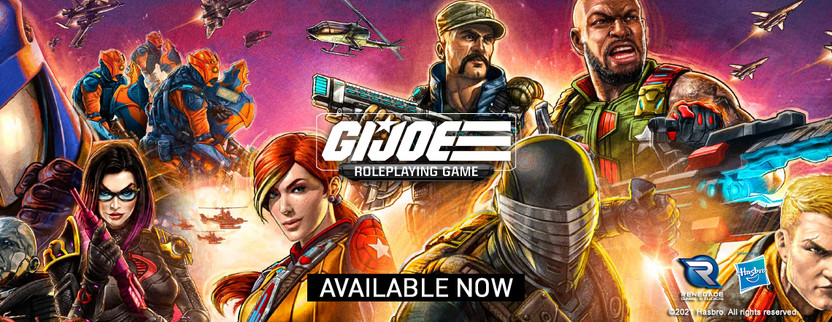G.I. JOE Roleplaying Game: Basic Training!
Posted by Renegade Game Studios on Apr 26th 2022
As the G.I. JOE Roleplaying Game lands on shelves around the
world, many fans of this iconic brand are delving into roleplaying games for
the very first time! This article features top tips that will help those
individuals enter the world of RPGs, whether you plan to start as a player, or game
master! While these tips are aimed at newcomers, they will also serve as a useful reminder for seasoned RPG veterans, and will enrich your adventures to come!
 Top Three Tips for Game Masters
Top Three Tips for Game Masters 
Don’t be a storyteller, be a story-crafter...
Many players will attest that one of the most magical aspects of RPGs comes through player expression. As the GM, you can capitalize on the creative nature of player expression by allowing a story to manifest from that expression. It is a valuable skill for a GM to see things from their players’ perspectives, and to allow the story to build in the direction which they naturally gravitate towards. As the GM, you should weave together a player centric story, crafted through the direction that comes from your players' choices, which then leads to interesting plot points that you have planned. In short, aim not to tell your story, but your players’ stories.
Don’t write a campaign, write plot points...
Building upon the first suggestion, this tip aims to keep
campaigns feeling natural and fluid for your players, as well as making the
most of your prep time. As noted above, a great campaign is crafted by the
players and the GM in tandem, rather than by one or the other. The players will
generate the story through their choices, but GM crafted plot points are
essential to keep players invested and make sessions feel well-developed.
When crafting plot points, don’t worry about how your players will reach that
point; instead, treat their choices as a multiforked path that inevitably leads
to a single general plot point that drives the overarching story forward. The tricky bit
is making this feel natural, and not forced. Our primary tip for this, is to
never be afraid to modify plot points to fit the current evolution of your
campaign. That is why general plot points, without overly specific contingencies, work best for this strategy.
Write plot points that interact with your player’s character backstories...
Our third and final tip for GMs again builds upon the former. When crafting the aforementioned plot points that will direct the flow of your campaign, aim to always ensure they are relevant to your players. Carefully read your players’ backstories, and utilize key pieces of their stories as inspiration for your plot points. The strategy of interweaving the plot with your players' character histories is an instant hook that will keep them feeling engaged, and most importantly, like a central part of the story. This will also lead to more opportunities for character development!
Now that we’ve covered our top tips for game masters, we’ll dive into our primary tips for players! It is important to remember that as players, we have just as much responsibility as the game master to make the game fun for everyone!
 Top Three Tips for Players
Top Three Tips for Players 
Aim to elevate your fellow players...
Speaking in-character, especially for first time players, can be a challenging feat for many. It takes courage to step out of your own skin, and try to bring a character of your creation to life. The best way to address this challenge, is for each player to always make efforts to support and encourage their fellow table mates. If you notice the spotlight hasn’t been on a certain player for some time, push it their way through your character’s actions! This is one of the best habits a player can display, and it will be equally appreciated by your GM, and fellow players.
Always seek to drive the story forward...
This is an important tip, and a skill set that many GMs will agree sets a good player apart from a great one. As a player, it is important to remember that the responsibility of developing the story does not solely lie with the GM. Imagine a movie where the main character doesn’t follow-up on any of the hooks or story prompts that are delivered to them. The writer, or GM, crafts the story – however, it is ultimately up to the characters to lead and drive that story forward. When making decisions as your character, always consider the story consequences, and the effect they will have on the overall flow of the campaign. As long as you consistently aim to develop the story through your character’s actions, you can rarely go wrong with any choice.
Don’t argue with the GM...
This is a common tip that will bring a smile to the face of
many RPG veterans. We have surely all been guilty of this at some point, but
would likely all agree that it is not conducive to a good experience for the rest of the table. At times, while playing an RPG, you will forget that this
is happening on somebody's table (or over the internet). It will feel as if the judgement of the GM is
of utmost importance, and may elicit real emotional responses; especially if that
judgement does not favor your character in a particular situation. The key
thing to remember here is that your GM has the best interest of the story in
mind, and that you should trust them. If something is consistently occurring that is legitimately impeding on
your experience, it is best to discuss these things with your GM outside of
session. A good GM will always listen to feedback, as their ultimate goal is to provide a fun experience!


